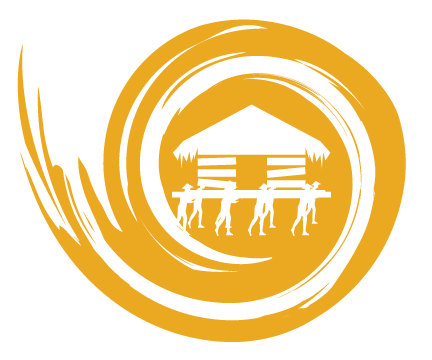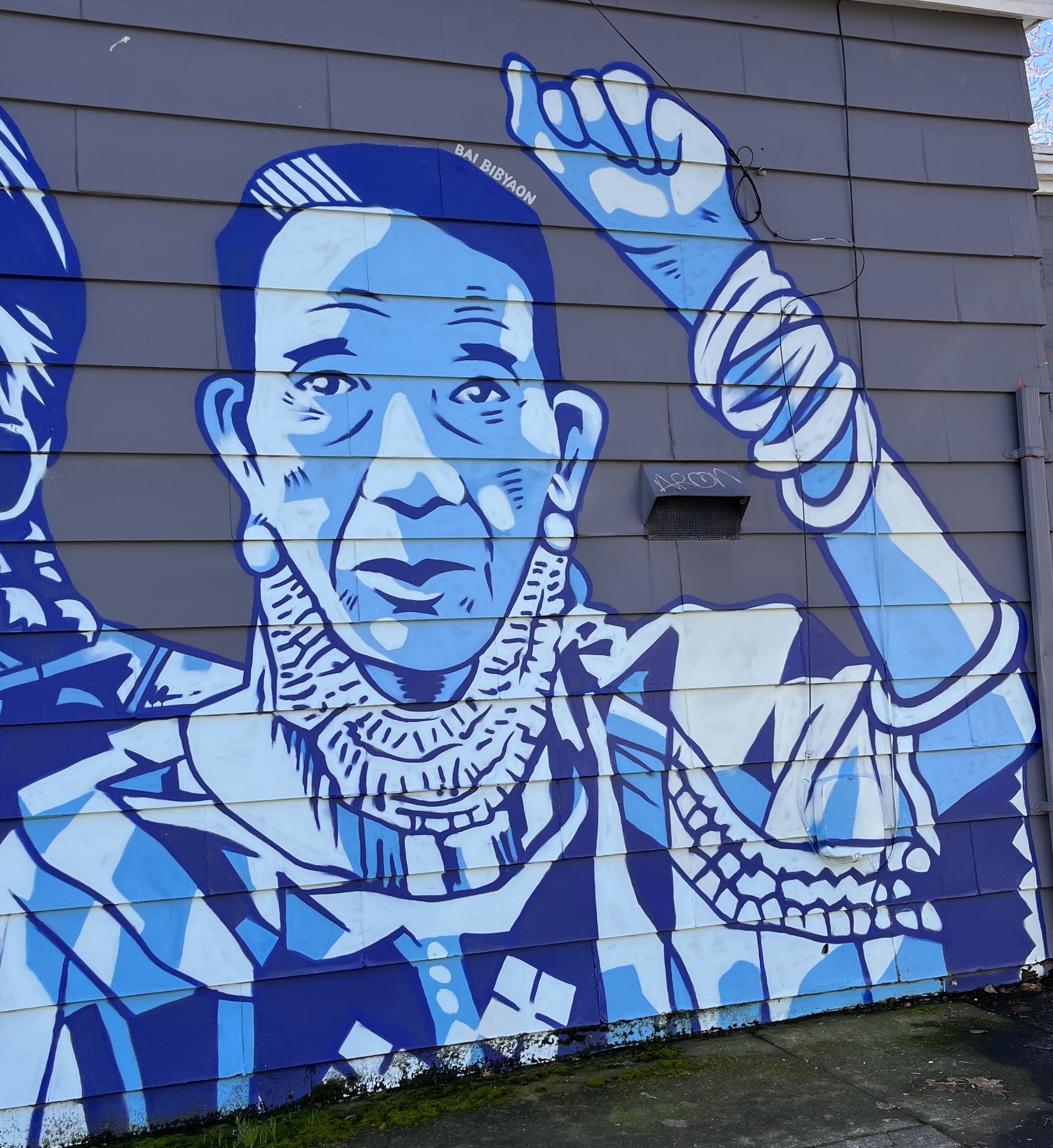Mabuhay si Bai Bibyaon Ligkayan Bigkay!
Bai Bibyaon Ligkayan Bigkay was a Lumad chieftain whose portrait is part of the Filipino Bayanihan Center’s Unsung Heroes mural
A statement from Sabokahan Unity of Lumad Women
“When I leave here, I will become a guiding light for you all. Don’t give up, but continue the struggle.” - Bai Bibyaon Ligkayan Bigkay in her final days
On November 20, 2023 Bai passed away while surrounded by loved ones. As she had requested, she was buried soon after passing. Although her body is now laid to rest, her courageous spirit and lasting legacy live on through our struggle.
From the most remote of Lumad villages in the mountains of Mindanao to prestigious universities in the Philippines' national capital and esteemed international platforms, Bai's fierceness, passion and courage has inspired generations of environmental, women's and children's rights and indigenous rights advocates to take fearless and sustained action.
Ligkayan Bigkay was born in the Pantaron Range in Natulinan, Talaingod, Mindanao to Matigsalug-Manobo parents about 90 years ago, though the exact date is unknown. Her title “Bai” is an honorific and “Bibyaon” was added when she became chieftain. She was the first woman to be selected as chieftain in the Talaingod Manobo tribe. In her youth, she was recognized by her community as an effective and reliable mediator in resolving conflicts.
Since the 1980s, Bai has been at the forefront of the Lumad struggle for self-determination. In 1993, logging company Alcantara & Sons violated an agreement with the Lumad in Talaingod, by excessively logging their ancestral lands. Bai was essential in uniting, empowering, and rallying Lumad across villages to stand up to the loggers through “pangayaw,” a traditional warfare method which is the lumad’s traditional form of resistance for ancestral land defense and survival. This victory against large-scale logging protected old-growth forest which is the home of Lumad, and whose biodiversity is vital in mitigating climate change not only in the Philippines but across Asia.
Bai chose to never marry saying she has everything within her to survive such as hands, feet and a head– we often joked with her that she was happily married to the struggle and inherited hundreds of grandchildren who look to her for guidance. Throughout her life, Bai not only defied feudal-patriarchal gender norms, prejudices, and limitations but helped create new opportunities for Lumad girls, women, and LGBTQ.
At the end of the Marcos dictatorship in 1986, she helped found the Salugpungan Ta Tanu Igkanugon council, which built more that 50 Salugpungan Lumad schools and learning centers in Pantaron and other indigenous communities. To diversify and strengthen pangayaw, the youth needed to be literate in order to protect their communities from further deception by predatory companies and the manipulation of the law. Bai was a tireless advocate against "buya," or child marriage and arranged marriage and painstakingly partook in educating her community about sending the children to school instead. Understanding that families often marry off their daughters in response to conditions of extreme poverty and hunger, the schools concretely transformed the role of girls. Rather than being confined to domestic roles and marriage, they could now become community health workers, teach scientific sustainable farming methods to improve the community’s food security, and school teachers.
In 1986 Bai was part of the assembly Mindanao Peoples Federation (LMPF) which came together in response to the threat of ethnocide, resolving to use the collective term "Lumad'' to give political power and a unifying identity to the 18 ethnolinguistic tribes of Mindanao. In 2003, she was the founding chairperson of Sabokahan To Mo Lumad Kamalitanan or “Sabokahan Unity of Lumad Women,” as part of her vision for generations of Lumad women to not only be participants but leaders in the fight for self-determination. Bai was involved in the creation of national formations for Indigenous organizations KATRIBU Kalipunan ng Katutubong Mamamayan ng Pilipinas and SANDUGO Movement of Moro and Indigenous Peoples for Self-Determination. She worked alongside and consistently expressed solidarity for peasant farmers, agri-workers, urban poor, youth and students. While rooted in local, grassroots organizing, she never lost sight of an international perspective, calling for unified resistance against shared oppression.
Bai experienced, survived, and resisted militarization and development aggression throughout her entire adult life. In response to grave human rights violations like the extrajudicial killings of Lumad civilians, Bai led her people in mass evacuations or “bakwit” by the hundreds in the 1990s and again in 2014. They found refuge from military and paramilitary violence in UCCP Haran in Davao City where children were able to continue their education. From within evacuation centers (“bakwit”) and by joining protest caravan Manilakbayan ng Mindanao or “Journey of Mindanaons to Manila,” Bai leading Sabokahan helped lead strategic Lumad rights campaigns which successfully garnered national and international coverage and attention, mobilized hundreds of Filipino youth to join progressive mass organizations, and made it impossible for the Lumad struggle to be silenced or unseen.
As a prominent figure in the fight for women, indigenous and environmental rights, Bai posed a haunting threat to the multinational companies and complicit politicians who actively attempt to plunder Mindanao’s estimated $1 trillion worth of natural resources. This made her a prime target for red-tagging, threat, and surveillance especially under following the Duterte administration’s declaration of Martial Law in Mindanao, passage of the Anti Terror Law, and creation of the National Task Force To End Local Communist Armed Conflict (NTF-ELCAC).
Since 2018, Bai did not return home to Mindanao for fear of her arrest, being forcibly paraded as a “surrenderee” or extrajudicial killing. She made the conscious sacrifice to live away from Pantaron to continue to guide her people safely. In 2021, the 56th Infantry Battalion of the Armed Forces of the Philippines in collusion with the Talaingod local government, forcibly gathered Bai Bibyaon’s relatives to sign affidavits calling on her “immediate rescue.” The NTF-ELCAC spread fake news that she was being trafficked by “communist terrorists.” In response, Bai issued a public video statement to counter the blasphemous accusations and to condemn the intimidation tactics used against her relatives.
Bai has received distinguished recognition for her work as a human rights defender. In 1984, she was the Most Distinguished Awardee of the 5th Gawad Bayani ng Kalikasan or “Environmental Heroes Award”. In 2017, she received the Gawad Tandang Sora award named after Tandang Sora, the “Mother of the Philippine Revolution”, by the University of the Philippines Diliman College of Social Work and Community Development. In 2018, she received again the Gawad Bayani Ng Kalikasan by the Center for Environmental Concerns. In 2019, she received the Ulirang Nakatatanda Award by the Coalition of Services of the Elderly. And in 2022, she received the Ginetta Sagan Award by Amnesty International USA.
Even if she had not won such several prestigious awards and accolades, Bai would irrevocably be immortalized as a hero of the masses. With her background as a rural Indigenous farmer and as a Lumad woman who was deprived of the basic right to education including literacy, she represents the majority of marginalized masses.
Through her life work, Bai has helped to expose the semi-feudal, semi-colonial, and bureaucrat capitalist conditions of the Philippines which hurt all sectors including Indigenous peoples. She has given girls and women everywhere a clear image of empowerment and liberation and has set an example for the world of how to advance human and environmental rights.
She has reminded the us that in order to protect the humanity and the planet we must listen to Indigenous peoples, ensure the land is in the hands of its tillers and its stewards, and not let anything break our unity in the face of attack.
May her example of sacrifice, revolutionary hope, and unwavering commitment live on through current and future generations!
Ato ki! Lumaban tayo!
Mabuhay si Bai Bibyaon Ligkayan Bigkay!


